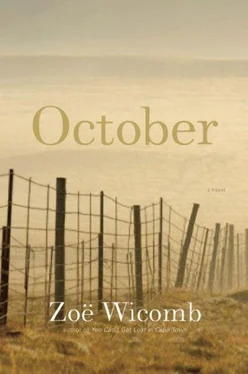An indefatigable tourist you, that’s what you are, Craig said the following day, playfully tugging at the cord of her trousers. Why not stay put today, lie on the beach, drink minty mojitos in the sun?
But no, Mercia needed to press on, tick off Manrique’s architectural sites that simply had to be visited. Craig flicked through the brochure.
Jardín de Cactus? Nope, he said, that’s where I draw the line. Being conscientious is not my thing. I’ve seen enough cacti without even looking, and what’s more, I happen to know that you bloody hate cacti too, so what’s with the spending good euros on a garden full of the vicious stuff?
Mercia went alone, driving fearfully, gingerly, on the wrong side of the road. Craig was the driver, that was the deal he’d so casually reneged on, but she’d be the last person to mention it. Besides, the garden was worth the troubled drive. An old quarry at Guatiza had been transformed into an exquisite circular structure, an amphitheater with terraces of cacti from all over the world. Once again she admired the now familiar use of volcanic rock crafted into a pattern of crazy paving, paths that wound dangerously around the tiers in defiance of health and safety rules.
In that warm, sunken space, protected against Atlantic winds, large mammillaria of thorn and robotic limbs of vicious prickles stood starkly against the blue sky. Here Mercia found, as she knew she would, the species from home. Euphorbias from Transvaal, quaintly labeled in the old geographic names of the trekkerboer, and the very melkbos from Kliprand — here sporting fleshy flowers — turned out to be another type of euphorbia. She thrilled at seeing the name given by Portuguese seafarers: Cabo de Buena Esperanza. Her own Cape of Good Hope, words printed on the municipal exercise books and rulers of her childhood. How often she derided that childhood. Yet, she could not but savor the memory of a little girl riding on her father’s shoulders as he taught her the homely names of plants.
Mercia thought of the Swiss mercenaries who in bygone days, hearing the sound of cowbells, fell ill to the new name of nostalgia and languished for home. Was she here in the Jardín de Cactus being pricked into Heimweh? Was there no telling the difference between Fernweh and Heimweh? Did the former lead to the latter? Only a small matter then of shifting prepositions? Was there no choosing between the contradictions of longing for and longing to be away from home?
Pull yourself together, girl! she admonished. Mercia had to remind herself that she preferred the lush flora of the Northern Hemisphere. Could Kliprand be aestheticized like this volcanic quarry? She feared not.
On her return, Craig was not to be found reading his book on the balcony, with lunch prepared, as they had earlier arranged. There was no note. For a moment panic struck as she swiftly checked the bathroom and kitchen, and foolish tears threatened. Something ominous had happened. Had Craig left? packed his bag and gone? But no, his bag was there. Mercia took a deep breath. No doubt he had wandered to the beach for a swim. She splashed her face in cold water, grabbed her swimsuit, and walked down briskly to find Craig just emerging from the sea.
You’d better not go in, he said, as he offered his pale lean back for the rubbing in of sunscreen. A notice has just gone up, and he pointed to the board. Medusa has arrived, so swimming is not recommended today. He mimed the waving of jellyfish tentacles. Anyway, it’s lunchtime. I thought we’d have tapas here at the café. My treat, he grinned.
And I’ll see if I can find you a Daily Record and flat Scottish beer, Mercia said. Was he not going to ask about her driving?
Funny how Craig did not seem to hate that kind of holiday after all, seemed to take to lounging about in the sun like a duck to water. So that it came as a shock when on the fourth night he said he had had enough. Even of Manrique. That Mercia should excuse him from further sightseeing. He stayed at the apartment with his laptop, writing or sulking on the balcony in the sun.
Mercia found that driving on the wrong side of the road was not as terrifying after all. Dinners in the evenings were civil, even pleasant, since she was determined not to admit defeat. There was no question of probing. Craig had surely already met the new woman. Had he been pining for her? Mercia had always thought that she would know instinctively if Craig were to be unfaithful; she is ashamed of having had no idea.
Mercia thinks she should forgive herself the cowardice. She must have sensed that their days were numbered, that probing would hasten the end. Now, driving along the deserted national road to Cape Town, burdened with knowledge that she would not like to pass on to anyone, she feels something lift, feels relief that Craig has gone, that he has found someone else, left, departed, dumped her — whatever. Wincing at the thought of her abject questions, Mercia is grateful that he refused to supply any details of the new relationship. He was right: she is better off not knowing, and thus not having any basis on which to imagine his new life. Now that she is freed from telling him about Nicholas, Craig can surely no longer be mourned.
Here, approaching the city, with a garishly lit Table Mountain growing closer and the cool coastal breeze in her hair, the briny air brings a strange calmness. Mercia notes that she is speeding. She takes her foot off the accelerator.
Much as Mercia would like to discuss Nicky with her dear friend Bella, who after all has raised three children, she is relieved that Bella is still visiting her own family in Port Elizabeth. They both arranged to return at the beginning of the following week, but fortunately Mercia has keys and may come and go as she pleases. And fortunately she left a suitcase at Bella’s. She has not brought back her bag from Kliprand, does in any case not want to wear the clothes tarred with the nastiness of uncovered history.
Mercia is just in time to pick up bread and coffee at the 7-Eleven store. Funny how she has returned to coffee since Craig has left. She looks forward to a bath, imagines the effluvium of shame taking form as a grimy ring left on white enamel. Mercia hopes to hole up for the weekend, or rather, settle in the shade of the garden with the problematic chapter of her book. She expects it to be a struggle, but away from Kliprand she might well return to writing. It would be good if Bella could look over that chapter. Bella is a social scientist who is amused that after all these years Mercia still writes about South Africa. They have been reading each other’s work ever since their student days, and Mercia’s absence leaves her more in need than ever of her friend’s local take on home affairs.
The alarm system bleeps as she opens Bella’s front door, and then her mind goes blank. Damn, she can’t remember the numerical code, the bloody code she used only a few days ago. Now there is the usual drama of the security company arriving, the usual absence of neighbors too fearful to investigate the blaring alarm but peering through the blinds all the same. Fortunately Mercia remembers the code name to cite to the uniformed security guard who arrives armed to the teeth, a name that will legitimize her entry. As it happens, she was there visiting when Bella moved into the house and had the alarm installed.
Let’s have Cedric Visagie as the code name, and together they laughed, remembering the handsome, charismatic young man from their student days who had had the audacity to date them simultaneously. He had fabricated for each a story about having to keep their relationship secret, something to do with his role in what they inferred to be MK, and the young women, feeling the thrill and privilege of their brush with the armed wing of the revolutionary movement, were eager to comply. Although not bosom friends at that stage, they had rooms in the same student house, each conducting her secret relationship. Until Mercia grew suspicious. She thought that she had seen Visagie’s car drive slowly past the house just as Bella came in and babbled about being out with a cousin at a new club in Woodstock. Fabulous new band, she said. Mercia should come along some time.
Читать дальше












